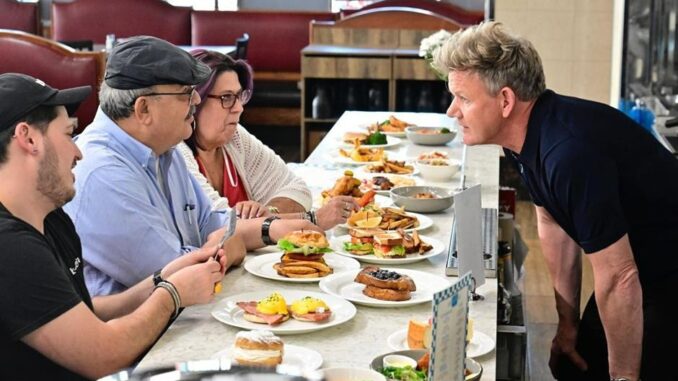
With a new season of his series “Next Level Chef,” reality TV’s most enduring antihero still reigns supreme. How long can he keep it up?
Two men are pictured in a professional-looking kitchen that includes large ovens and cooking tools and appliances in the background. The man on the left, in a burgundy crew neck sweater and hair in a blond quiff, gestures with one hand, while the other, wearing an apron, makes the gesture for “OK” with his fingers.
A competitive intensity has been crucial to Gordon Ramsay’s continuing success. When he isn’t working or cooking, he is watching cooking shows, including scripted dramas like “The Bear.”
Gordon Ramsay insists he never wanted to be the bad boy. His image as the brash, bellicose chef and restaurateur, as the master of the culinary meltdown, was, he said, largely a matter of getting off on the wrong foot.

Ramsay was introduced to British viewers on “Boiling Point” (1999), a five-part series on Channel 4 chronicling his turbulent efforts to open his first restaurant. At around the same time, BBC Two launched “The Naked Chef,” a breezy, upbeat cooking show starring the young chef Jamie Oliver. The two shows, and the two chefs, could hardly have seemed more different.
On the one hand, you had Ramsay, a surly perfectionist, firing a waiter for drinking water in view of customers. “And then literally at the same time, on another channel, there was Jamie,” he recalled in an interview last week, “this floppy-haired Essex boy, sliding down the banister doing one-pot wonders.”
“The nation fell in love with him,” Ramsay said. Whereas with himself, he added, “the nation wondered what the hell was going on.”
Ramsay’s explanation may not entirely account for his enduring infamy as an explosive TV tyrant — it wasn’t Oliver, after all, who named Ramsay’s signature series “Hell’s Kitchen,” and he hardly forced Ramsay to bludgeon countless chefs and restaurant owners with colorful jeremiads for the past 25 years on air. But that Ramsay still brings up old rivalries when discussing his reputation is revealing, a glimpse of the competitive intensity that has been crucial to his continuing success.
That competitiveness is one reason that the host of roughly two dozen shows over the years, including “Next Level Chef,” returning on Sunday for its third season on Fox, still devotes so much of his down time to watching other food shows. It’s why, during the pandemic lockdown, he threw himself headlong into social media. And it’s also why, at 57, Ramsay has no intention of calling it quits.
“When I started this career, it was nothing to do with money — it was passion and the drive to be the best,” he said. “The longevity comes down to not taking anything for granted.”
If Britain was ever truly skeptical of Ramsay, it’s safe to say that it and much of the world have come around. Today, he is one of the most recognizable names in television, the producer and star of popular reality shows on the BBC, ITV and Channel 4 in Britain and on the National Geographic network and Fox in the United States. “Hell’s Kitchen,” the competitive cooking series he has hosted on Fox since 2005, just wrapped its 22nd season on Thursday; Ramsay estimates he has shot over 1,200 hours of content for Fox alone.

“Next Level Chef,” one of his newest shows, is a kind of cooking gantlet in which a mix of home cooks, social media influencers and professional chefs compete across an elaborate three-tiered arena. Ramsay called it a “smorgasbord of all the best bits that have worked on various shows,” combining the rapid-fire live services of “Hell’s Kitchen” with the extreme scrutiny of “MasterChef.” It also displays Ramsay’s softer, more encouraging side, seen on shows like “MasterChef Junior,” where he is more paternal hype man than shrieking despot.
The brash restaurateur is one of the most recognizable names in television. But don’t call Ramsay a TV chef. “I’m a serious chef,” he says, “and I happen to work on TV.”Credit…Fox
“Gordon really appeals to every member of the household,” Rob Wade, the chief executive of Fox Entertainment, said in an interview. “There’s just enough edge to entertain the older viewer, and just enough comedy to entertain the younger viewer, and I think his authenticity is so apparent that people are drawn to him.”
But even after a quarter-century in front of the camera, Ramsay insists he does not see himself as an entertainer. “I’m not a TV chef,” he maintained when asked about his show business career, despite the impression some may have of him. He elaborated: “I’m a serious chef, and I happen to work on TV.”
It is true that Ramsay was already well-established in the culinary world before he became a TV star. A former protégé of decorated chefs including Joël Robuchon and Marco Pierre White, he opened his first restauran
t, Restaurant Gordon Ramsay, in 1998, earning three Michelin stars within a few years. He was the first Scottish chef to earn that distinction, going on to amass 17 in total, of which he currently holds seven, including for Pétrus, in London, and Le Pressoir d’Argent, in Bordeaux.
Some of his other restaurants are less esteemed. His international burger chains have gotten mixed reviews, while the Hell’s Kitchen chain in the United States is effectively a Planet Hollywood-type novelty that promotes the series and vice versa. The more than 80 restaurants operated today by Gordon Ramsay Holdings combine for a powerful brand, though he says that they remain a passion — one he draws on for inspiration.
“Everything that I do and develop in those restaurants gets brought into that TV world, to keep it real,” he said.
Whatever his imperious reputation, Ramsay is chummy and solicitous in conversation. He apologized profusely when technical issues delayed our interview. He asked questions about my life and seemed genuinely interested in the answers.
That warmth and affability come in sharp contrast to the one-dimensional persona that Ramsay is sometimes reduced to — whether in YouTube supercuts, parodies or advertisements for Ramsay’s shows that emphasize the swearing and screaming. Ramsay said he never tried to cultivate that attitude of acid swagger, and he bristled at a suggestion that Fox may have marketed him as more flamboyantly irate than he really is. (The near constant cursing, as our conversation made clear, is not an affectation for TV.)
Nyesha Arrington, a former “Top Chef” contestant who co-hosts “Next Level Chef,” praised Ramsay’s professionalism on set. “People might say he’s a polarizing character, but the man is pure excellence,” she said. “You see it in how he runs his teams and the amount of respect they have for him. It’s not a fear-based mentality.”
Although Ramsay does not often work in the kitchen professionally anymore, he still loves to cook. “It’s in my blood, right?” he said. During Covid, he joked, he was the “in-house chef who got paid very little” for his three teenage daughters.
Whenever Ramsay isn’t working or cooking, he is watching cooking shows. “Every time I fly, I’m always downloading some new food program,” he said. That includes scripted dramas like “The Bear,” which Ramsay said offers “the closest insight to the reality that goes into restaurants on a daily basis” that he has seen.
All this food TV bingeing might seem like a strange pastime for one of the world’s most successful chefs. But Ramsay remains obsessed with keeping up with the food world and seems driven by an insatiable need to keep proving himself, to keep winning.
“He says yes to so many things,” Wade, the Fox chief executive, said. “I mean, that thing with the chile peppers?” he added, referring to Ramsay’s appearance on “Hot Ones,” the YouTube chicken-wing show hosted by Sean Evans. “He doesn’t have to do that. But he’s the one who wants to get out there.”
Image
On a TV production set for a cooking show, a panel of three, including the chef Gordon Ramsay in the center, are captured in a scene. Ramsay appears to be speaking and points one finger skyward, while the other two look on, smiling.
“Next Level Chef,” a competition series, displays Ramsay’s softer, more encouraging side. Above, with his co-hosts Richard Blais, right, and Nyesha Arrington, who called Ramsay “pure excellence.”Credit…Lorraine O’Sullivan/Fox
Richard Blais, one of Ramsay’s co-hosts on “Next Level Chef,” said he was stunned by how much work Ramsay did on and off the show, including taking the time to sort through ingredients on set by hand. Mainly he was surprised by Ramsay’s interest in social media.
“I remember him saying that if there’s something going on in the food world, he wants to compete in it,” Blais said. He pointed to Ramsay’s TikToks and Instagram Reels, in which he scrutinizes home-cooked dinners with exaggerated menace, a playful riff on his reputation. Ramsay began producing the videos with his daughters during the early days of lockdown, and they have exposed him to tens of millions of people who may not watch Fox but adore the likes of Mr. Beast.
“I never set out to formulate that because I was trying to garner a different audience,” Ramsay said of his viral content. “It sort of happened organically.”
Not all of Ramsay’s creative gambles have paid off. “Hotel Hell” and “24 Hours to Hell and Back,” variations on his restaurant recovery show “Kitchen Nightmares,” didn’t resonate as much as the original. And “Kitchen Nightmares” itself has caused Ramsay plenty of grief, owing to the eventual fate of some of the restaurants he has tried to save on the show.
“When they succeed, I don’t get praised,” he said. “When they fail and close down, you get blamed. So I’m [expletive] either way.”
Some restaurant owners who appeared on the series have publ
